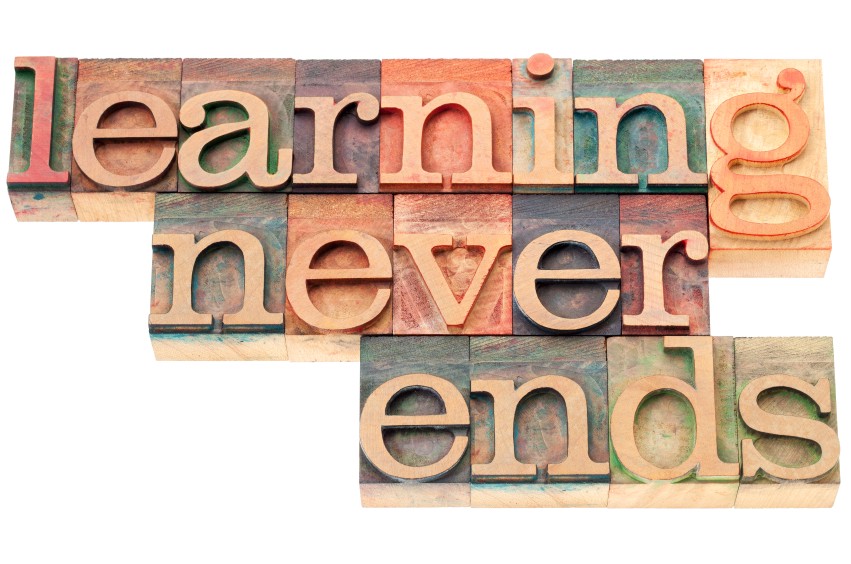As a technologist you often read article after article about continuous development, development operations (DevOps), agile delivery or incremental improvement methodologies. We live the pace of change in technology every day and feel the pressures to deliver more and more. Of course this is also followed by better, faster and cheaper. However all of this great improvement in how and what we deliver as software engineers puts pressure on all of us to keep up with the trends of our industry. If you don’t build in think and learning time you will quickly become obsolete and struggle to meet the ever-changing expectations on you and your department. Just as we are being pushed into continuous delivery, to remain relevant you have to take on a personal journey of continuous learning.
It is easy to de-prioritize continuous learning and just allow the daily grind of our work take over all of our time. Between meetings, emails, flybys and just pure production of work product, it is all too common to just give-up on continuous learning. Couple this with the fact that many companies just don’t understand how to provide the right opportunities for continuous learning. They certainly don’t carve out time for you to learn and more often than not, do not have very large budgets to support class room based training, conferences, or even books. This puts the onus on you to ensure you are continuously learning. To remain relevant in your organization, competitive in the marketing place, and simply inspired as an individual, figure out how to prioritize continuous learning.
It is easy to de-prioritize continuous learning and just allow the daily grind of our work take over all of our time.
Create a Learning Community
One way to ease the burden of trying to learn something new is to find others with like interests or expertise in what you want to learn. Pull them together and have a dialogue, work on a small project together, or simply bounce ideas around. Formalize the concept of the learning community. Have you always wondered how to build a mobile app or develop your own API? Create an API community where you can share knowledge, articles, books, online tutorials and ask for advice as you start down the path to creating your first API. Pull your community together over lunch, or develop a collaboration site.
Massive Open Online Courses (MOOC’s)
There is more access to high-quality free courses than ever before. Companies like Coursera.com, Lynda.com, iTunes U, CodeAcademy and online courses from Universities such as Stanford, Harvard, MIT and dozens of others are free and easy to access. Most of these courses enable you to go at your own pace, often have virtual communities you can tap into, and structure your work with exercises, text books and supplemental reading. In 6–12 weeks you can pick up a new skill at no cost to you except for your time. Don’t wait, go explore for a course now and commit to seeing it through.
Open Source
It used to be that to really learn a new skill you may have to purchase software, development tools, build out a server, add a database and connect it to a network/internet. Now you can spin up an environment on AWS, Google Compute Engine, or Microsoft’s Azure in minutes and for pennies. These sites offer almost every technology under the sun that you can install and play with. From mobile app frameworks, Big Data tools such as Hadoop to packaged software such as SAP or Oracle you can quickly get access and start learning. Each of these infrastructure as a service offerings have broad communities, documentation, and tutorials you can tap into to start your learning journey.
Create a Library
So you want to read a book. It is expensive and you are hesitant to lay out the $50 or $100 to purchase it. Instead of just buying it for yourself, think about creating a library at work where everyone contributes to buying a book and putting it in the library. Many companies may even dedicate some funding to purchasing books if they know they will be available to more than just one individual. However, if you are still hesitant, don’t forget about the Public Library. Now, if you use an e-reader or read on your computer you can check-out eBooks from your public library. If you are a Kindle user, you can use the Kindle Lender’s Library as well. Finally, you may be able to deduct the cost of books that you personally purchase to continuous learning from your taxes. Talk with your accountant to learn more.
To learn anything, you have to commit to practicing your new skill.
Unconferences, Local Networking Groups, and Vendors
Most cities these days have dozens of local networking groups from specific user groups (i.e Ruby/Rails) to professional trade groups (i.e. ASUG or PMI). These are usually free to participate in, so take advantage. In addition, there has been a strong trend over the past 5 years or so in the creation of UnConferences. These are usually free or very low-cost (i.e. $25.00) to attend. They can cover a wide range of topics including how to fund your start-up to simple inspiration like Ignite Talks. Check out sites like Barcamp.org or EventBrite to find local events. Commit to attending an event in your area on a quarterly basis.
Articles, Videos, and Readers
Beyond conferences, class room learning, MOOC’s, or books are a plethora of information on the Internet from magazines, blogs, journals, or video sites like You Tube or TED talks. Think about using a Reader such as Feedly to aggregate content of interest to you. Search for communities on Reddit for relevant topics you are interested in. Carve out time in your day to spend 15 minutes reading up on trends, technologies that interest you or just explore random topics. The simple break form work will inspire you. With a tool like Feedly, Evernote or Chrome/Safari you can save articles or simply print them out and file them to read later. I tend to have dozens of articles that I save to read and when I can I just pick one up.
Develop a Personal Learning Plan
Spend a 30 minutes thinking about what you want to learn. Interested in robotics, mobile development, Big Data, API’s, improving your public speaking skills or written communication. Than map it out so you can make progress to your goals. Don’t over commit, you can pick just one topic to focus on for a full year or vary topics by month or quarter. It all depends on how deep you want to go in any given topic. For me, I wanted to learn about robotics, improve my speaking skills, and become an expert in DevOps. My learning plan consists of learning Arduino and building a robot with my daughter, committing to present at several local events to improve my speaking and reading about DevOps and apply what I learn to my work immediately.
To learn anything, you have to commit to practicing your new skill. Carve out that time and protect it vigorously from distraction. Don’t wait to start your continuous learning journey. Bring others along with you to increase your likelihood of success. Finally, don’t forget to enjoy the process.


